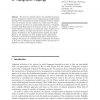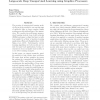973 search results - page 61 / 195 » Arguing Using Opponent Models |
141
click to vote
ALIFE
2006
15 years 2 months ago
2006
We show how cultural selection for learnability during the process of linguistic evolution can be visualized using a simple iterated learning model. Computational models of linguis...
105
click to vote
PROCEDIA
2010
15 years 16 days ago
2010
Sexual selection has been mathematically modeled using quantitative genetics as well as population genetics. Two-locus simulation models have been used to study the evolution of m...
118
click to vote
ICML
2009
IEEE
16 years 3 months ago
2009
IEEE
The promise of unsupervised learning methods lies in their potential to use vast amounts of unlabeled data to learn complex, highly nonlinear models with millions of free paramete...
165
Voted
ICASSP
2008
IEEE
15 years 8 months ago
2008
IEEE
Non-negative matrix factorisation (NMF) is an unsupervised learning technique that decomposes a non-negative data matrix into a product of two lower rank non-negative matrices. Th...
145
click to vote
ECML
2005
Springer
15 years 7 months ago
2005
Springer
Partially Observable Markov Decision Processes (POMDP) provide a standard framework for sequential decision making in stochastic environments. In this setting, an agent takes actio...


